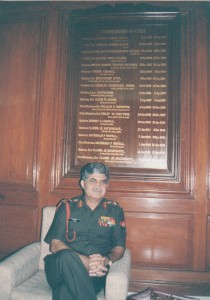[I interviewed General Ved Prakash Malik in New Delhi in August 1998, a few months after India conducted nuclear tests at Pokharan. Gen. Malik, who was born in Dera Ismail Khan, in what is now Pakistan, was the 19th Chief of Army Staff of the Indian Army. The room I interviewed him in had also been used by the Commanders-in-Chief of the pre-Independence Indian Army. The board in the picture below includes the names of Gen. Horatio Herbert Kitchener, Gen. Claude Auchinleck and Gen. Sir George Stewart White, who commanded a sepoy brigade in the Third Anglo-Burmese War, which led to the deposition of King Thebaw, the last king of Burma (as described in The Glass Palace.) It was odd to see this name there, because I was then still working on the book: it was a reminder of the continuities and ruptures of India’s military history, which was actually one of the central themes of the novel.]
AG.: What was exactly the military logic behind the testing at this time. Are there any pressing security reasons?
Gen. V.P. Malik.: Nuclear weapons are not military weapons. So the first thing I’d like you to notice is that these are political weapons and they must be viewed as such, they are today weapons to deter others from using this weapon—those who have it.

So firstly it is not a military weapon so far as we are concerned. Secondly it is a weapon to deter others so that we do not become a victim. It is to prevent or safeguard, to ensure that no one who has it should use it on us.
AG.: There has been a lot of talk recently about command and control systems and whether there are any in place at the moment. Can you comment on this?
Gen. V.P. Malik.: Well, it’s being discussed. All I can tell you is that whatever command and control that can be put, the whole thing would be put totally under the control of a political authority.
AG. So it will essentially be under civilian control.
Gen. V.P. Malik.: Yes.
AG.: So in effect you’re saying that army will have no control over those weapons? Is there going to be a separate strategic force just for nuclear weapons—as there were in Russia and the USA?
Gen. V.P. Malik.: Lot of people go back to those days of the Cold War—but there are a few ways in which our policies are clearly different. For instance we believe in no first use, so its not the same environment in which the USA or the erstwhile Soviet Union looked at each other during the Cold War.we will have minimum deterrence and the ultimate authority shall lie with civilian authorities. At the lower level, if and when the advice is sought, naturally it’s only then that the military will come in — but I wouldn’t like to comment on that now.
AG. If some day we do have nuclear weapons we will require procedures that would require marrying of nuclear warheads to delivery systems. Would that be under civilian control as well?
Gen. V.P. Malik.: Well, we are working on all those things where civilians, military, scientists all will be involved.
AG. What about tactical nuclear weapons?
Gen. V.P. Malik.: I don’t think we are thinking on those lines—the scientists, the technologists say they have the capability, but when we are talking about minimum deterrence, you’ll agree with me—we are not thinking about large numbers.
AG.: As far as control of nuclear weapons are concerned, you say that the army will be conceding a large part of its authority to civilian authorities. Is this something that the army welcomes?
Gen. V.P. Malik.: There has never been any dispute on that aspect. We are a democratic country, the army is an instrument for the services. And we are quite happy in giving control to civilian authorities—I don’t think the question of ‘giving away’ arises at all. And it changes nothing.
AG. I only meant that in a management sense—
Gen. V.P. Malik.: Well in any crisis situation, we have very close interaction with the departments and civil authorities. We have a system of the cabinet committee headed by the P.M. So when there are serious events taking place, we get our orders when we need to, either from the concerned minister or from the cabinet committee headed by the P.M..
